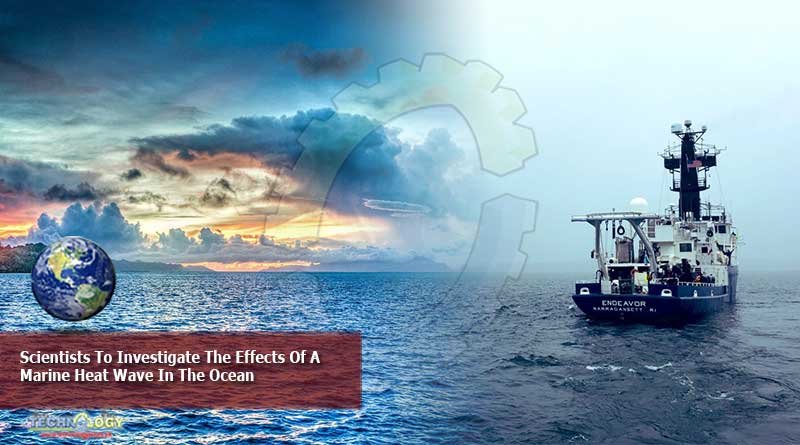A team of scientists from the University of Rhode Island investigate the implications of a marine heat wave in the offshore waters of New England.

A team of scientists from the University of Rhode Island and partner institutions have departed aboard the research vessel Endeavor for a five-day cruise to investigate the implications of a marine heat wave in the offshore waters of New England.
The waters on the continental shelf — extending from the coast to about 100 miles offshore — have been 2 to 5 degrees Fahrenheit warmer than usual since July, according to URI oceanographer Tatiana Rynearson, one of the leaders of the expedition. And that warmth could have significant impacts for local fisheries and the marine ecosystem.
“The water is very warm compared to the average of the last 40 years,” said Rynearson, a professor at the URI Graduate School of Oceanography who studies plankton. “The question we’re asking is, how is it affecting the ecosystem and the productivity of the continental shelf waters.”
The Northeast Pacific Ocean experienced a similar marine heat wave in 2014 and 2015, when what was described as a “blob” of warm water spread offshore from Alaska to California, resulting in major die-offs of fish and seabirds and closures of fisheries.
“The impacts went all the way up the food chain from that warm blob of water,” Rynearson said. “Similar dramatic impacts haven’t been documented for New England waters, but we’re going to try to understand what’s going on out there.”
Rynearson hopes the expedition will provide a clearer understanding of how the marine ecosystem responds to short-term heat waves and how it may react to the long-term temperature increases that are expected in the ocean due to the changing climate.
“We think these heat waves will happen more frequently in the future, so it’s important to understand how the ecosystem responds to them,” she said. “We’re also interested in whether the response to this heat wave will give us insight into the general warming trend.”
The expedition — which includes scientists from the Woods Hole Oceanographic Institute, Wellesley College, University of Massachusetts at Dartmouth, and the National Oceanic and Atmospheric Administration — is part of a long-term ecological research project funded by the National Science Foundation. Its aim is to compare how variability in the environment affects the ecosystem, from microscopic plankton to fish.
“From our ongoing study we’ve learned that there are two different kinds of water out there — cold, nutrient-rich water that supports a lot of fisheries production, and warm, less-productive water,” Rynearson said. “We’re interested in the balance between how long the waters are warm and nutrient-poor versus cold and nutrient-rich.”
The researchers will collect data along a transect from Narragansett to Martha’s Vineyard and then southward about 100 miles to an area at the edge of the continental shelf where the water is about 5,000 feet deep. Along the way they will take water samples at various depths to evaluate how much plankton is in the water, the rate of photosynthesis, and the rate that tiny marine animals called zooplankton are feeding upon tiny marine plants called phytoplankton.
“We’ll also be looking at what species of phytoplankton and zooplankton are out there, because there seem to be differences in the community when you have cold, nutrient-rich waters versus warm, nutrient-poor waters,” said Rynearson. “We’ll ask, are we still seeing a summer community of marine life out there or is it too late in the year for that.”
The research team also aims to gain a better understanding of the marine food web by studying the links between the tiniest creatures and the forage fish that are fed upon by the top predators in the ocean and captured in local fisheries.
“We’re probing a part of the food web that’s not well understood in terms of the transfer of energy or the response to climate change,” Rynearson said. “That part of the food web is a bit of a black hole, and we want to shine some light in there.”
Due to the COVID-19 pandemic, all of the participants in the expedition quarantined for two weeks prior to boarding the ship, and fewer scientists than usual will be aboard. Among the participants will be URI graduate students Victoria Fulfer and Erin Jones and postdoctoral researcher Pierre Marrec.
“A research cruise is always exciting and welcome, but during the pandemic, the cruise participants are particularly thrilled to be out at sea,” Rynearson said.
Originally published at westerly sun
